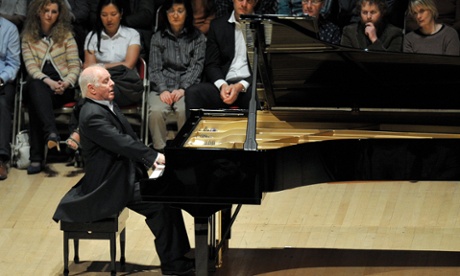
In four recitals spread across a week, Daniel Barenboim is playing 12 of Schubert’s piano sonatas at the Festival Hall. But at the first of the concerts it was the instrument that Barenboim has chosen for the series, rather than his performances, that was the main topic of conversation. Before it began, our attention was focused on the new piano that he had unveiled the previous day, and to which he has given his name. On stage, the instrument may look exactly like a standard concert grand, but under the lid things are very different, the differences intended, it seems, to combine the power and projection of a modern instrument with the range of colour and touch that can be obtained from 19th-century instruments.
In performance, though, the sound of the Barenboim seems much closer to that of a modern piano than it is to, say, a meticulously restored Broadwood or Erard from the middle of the 19th century (see the video of Barenboim playing the piano here). There’s certainly an airiness and transparency about it, a litheness to the bass and a crispness to the articulation that suggests the touch is much lighter than it is on a newly made Steinway or Bösendorfer, though there’s certainly not the sense of registration, of there being distinct soundworlds for the bass, mid-range and treble that was so characteristic of instruments of Schubert’s time and, as András Schiff demonstrated a few months ago in his recital on an instrument from the 1820s, became an integral part of his way in which he composed his piano music.
Barenboim’s first Schubert programme consisted of three sonatas in A – the earliest of the works in A minor, D537, followed by the two A major Sonatas, D664 and 959, and there was no doubt that the bigger-boned late work suited his approach better than either of the slighter, earlier ones. There was the feeling in D664 especially that he was trying to load more weight onto the sonata than it could bear, self-consciously spreading the chords at the ends of phrases in the opening of the first movement, and inserting rhetorical pauses into the big thematic statements. It was taking an expressive sledgehammer to a modest work that other pianists take convincingly at face value. In the great A major work, though, the sense of grandeur and seriousness fitted much better, even if the drama of the first movement seemed underpowered, and the outer sections of the slow movement lacked the lyrical ease they should have. It was interesting rather than revelatory Schubert playing.
• At Royal Festival Hall, London, 29, 31 May and 2 June. Box office: 0845 875 0073.

